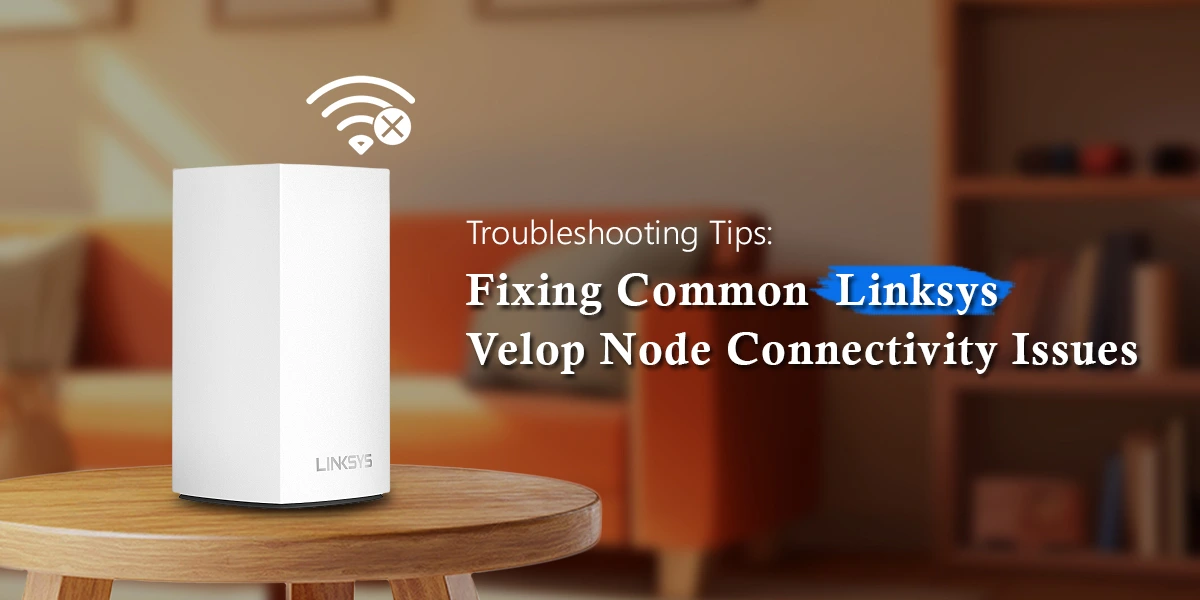
If you occasionally experience problems with connectivity, though, just like any other device. We will discuss typical Linksys Velop Node Connectivity Issue in this blog and offer helpful troubleshooting advice to make sure your mesh network runs properly.
Why Linksys Velop Node Connectivity Issue?
Linksys Velop node connectivity issues can arise due to several reasons. Understanding these can help you diagnose and resolve the problem effectively.
How To Resolve Linksys Velop Node Connectivity Issue?
If you’re experiencing connectivity issues with your Linksys Velop node, there are several troubleshooting steps you can follow to identify and resolve the problem:
Examine The Physical Connections.
Firstly, inspect the physical connections is the first step in resolving connectivity difficulties with Linksys Velop. Make that every node has power and is link to the network and power sources. Make sure the Ethernet cables are inserted into the designated ports securely. Connectivity troubles are frequently caused by easy fixes, such as loose cables.
Ideal Node Location
For optimal coverage, Linksys Velop depends on the thoughtful positioning of its nodes. Make sure that each node is suitably positioned. For optimal signal propagation, keep nodes away from walls, stay clear of physical obstacles, and minimise interference from other electronic devices.
Updates For Firmware
Incompatible firmware may cause issues with connectivity. Make sure to frequently check the Linksys Velop system for firmware upgrades and to avoid Linksys Velop node connectivity issues. Install any available updates by logging into the Linksys app or online interface, going to the firmware area, and logging in. Frequently, bug patches and enhancements that fix connectivity problems are include in updated firmware.
Channel Settings and Interference
The Linksys Velop system’s performance may be affected by wireless interference from nearby networks or electronic gadgets. To lessen interference, go to the router’s settings and change the channel.
Overload On The Network
The performance of your Linksys Velop system may be impacted by a network that is overloaded with connected devices. Examine all of the devices linked to your network, then rank the most important ones. If you find that your current bandwidth is not enough for all the devices connected to your home, you might want to consider upgrading your internet plan.
Restarting The Nodes
Firstly resetting the nodes can frequently fix persistent connectivity problems when all else fails. To perform a factory reset, use the Linksys app or the reset button found on each node. Then reconfigure the nodes in accordance with the setup guidelines following the reset. By doing this, any setup flaws that might be creating connectivity issues can be eliminate.
Settings For Quality of Service (QoS)
With the Quality of Service settings in Linksys Velop, customers can designate specific devices or applications as priorities. Then verify whether any particular hardware or software is consuming excessive bandwidth, then modify the QoS settings appropriately. Setting important devices first can improve network performance as a whole.
Troubleshooting Specific To Devices
If a particular device continues to have connectivity problems, address it separately. Restart the device, look for software upgrades, or simply forget and join the network again. Occasionally, the Linksys Velop system may not be the source of the issue, but rather the gadget itself.
End Thoughts
It takes proactive troubleshooting and routine maintenance to keep your Linksys Velop mesh network dependable and high-performing. You can resolve typical connectivity problems and make sure your Linksys Velop system has the smooth Wi-Fi experience it advertises by using these troubleshooting methods. To experience continuous connectivity throughout your house, make sure your nodes are up to current, adjust settings as needed, and pay attention to your network environment.